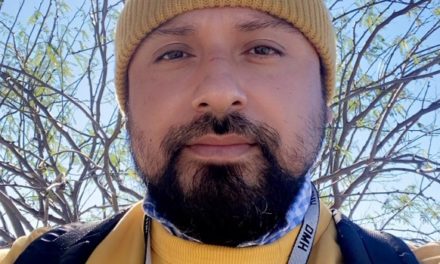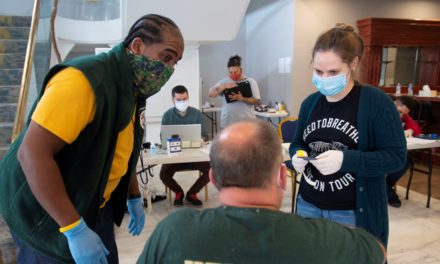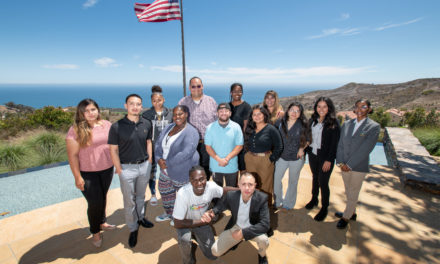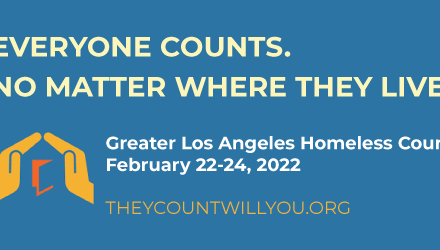by H. Chung So, Public Information Officer
Established in 2009 and expanded in 2018, LACDMH’s School Threat Assessment and Response Team (START) was developed as a response to the Virginia Tech Shooting in 2007. It identified the need for mental health resources and supportive services to help prevent premeditated school violence. At the time of its formation, START was the first program of its kind in the nation, bringing together professionals from educational, law enforcement, and behavioral health settings in a partnership to specifically prevent and address school violence.
“What we are here to do is to enhance and coordinate the services offered by school staff, mental health clinicians, and first responders,” said Maria Martinez, Ph.D., START’s Mental Health Clinical Supervisor. “In doing so, we reduce the likelihood of school violence by identifying early warning signs and connecting troubled individuals with appropriate resources before they resort to harming others or themselves.”
To highlight the demand for such services, Dr. Martinez and Miriam Brown, Deputy Director of LACDMH’s Emergency Outreach and Triage Division, cited the findings of the national Safe School Initiative Report. The report, which studied current or former students who attacked their schools through potentially lethal means, found that assailants often show concerning behavior – such as difficulty adjusting to social groups, prior actions resulting in school disciplinary action, and displaying an interest in violence – prior to their planning and initiating the attack.
By identifying these individuals at an early stage and intervening with appropriate services and resources, START staff and their community partners help stabilize their volatile thoughts, emotions, and behaviors, preventing explicit, implied, or hidden threats from escalating into actual acts of violence.
START takes a multidisciplinary approach to make this happen by offering a broad range of services, including:
- Training school staff, parents, students, first responders, and communities about characteristics, behaviors, and risk factors of school attackers, so they can catch warning signs early and make timely referrals to appropriate professionals
- Screening of individuals or situations of concern, including evaluating stated or implied threats by taking relevant risk factors into consideration
- Intervention in partnership with schools and law enforcement agencies, which can include connecting individual(s) of concern with anger management training, psychiatric evaluation, counseling, and treatment
- Ongoing monitoring and case management to ensure the individual(s) of concern are receiving continual help, as well as “postvention” of school communities affected by a recent violent event.
- Assessment of school policies and practices to improve services offered to the community, as well as improve situational awareness of potential threats
Additionally, should such an unfortunate incident occur, START staff will provide counseling, linkage, and supportive services to help affected school communities and reduce the likelihood of a “copycat” incident. Dr. Martinez noted this type of “postvention” was applied in the aftermath of the Saugus High School shooting in Santa Clarita.
To illustrate how these START services work in practice, Dr. Martinez highlighted a referral her team received about a student of concern. He had posted on social media about school shootings, where he sympathized with the shooters, and had told school peers about suicide and homicide ideation. The peers reported this to the school staff, who suspended the student and alerted START.
The team identified various factors affecting his mental health, including an unsupportive home life and experiences with neglect, depression, and substance use, as well as language and cultural barriers resulting in a misunderstanding of his mental health issues. START also identified protective/beneficial factors, including his solid academic performance and participation in his school’s wrestling team, and utilized them to help develop a safety net of services, including mental health treatment that is culturally- and linguistically-appropriate for him and his family. Through START’s ongoing partnership with the student, his family, and the school, the student continued to receive mental health treatment and was able to complete his classes to get his high school diploma.
In providing these services in a timely manner, Dr. Martinez said not only were they able to avert a disastrous outcome (had the student followed through on his threats), they helped changed his life trajectory for the better. Currently, that individual is working part-time, applying to community colleges, better engaging with his family, continuing to receive mental health services, and regularly meeting with START staff for follow-ups.
With successes like this scenario, START has become a role model for school violence prevention and has been recognized with numerous awards, including L.A. County’s Productivity and Quality Award, National Association of Counties’ Achievement Awards, and “Bright Ideas” Award from Harvard University’s John F. Kennedy School of Government.
More importantly, Dr. Martinez says START is continuing the important work of continuous collaboration, early identification, and timely intervention so that L.A. County schools remain safe for all. This program minimizes the risk of school violence tragedies such as those experienced by the communities of Uvalde, Texas, Parkland, Fla., and Sandy Hook, N.Y. The effort is further bolstered by this week’s unanimously-approved board motion to launch an education campaign to raise youth awareness of START so that L.A. County students—who may be the first to notice warning signs or threats of school violence among their peers and classmates—are better informed about START’s services and resources, how to identify concerning behavior, and how to make a START referral.
To learn more about START, visit https://dmh.lacounty.gov/start/. If you have additional questions about this program, email START@dmh.lacounty.gov.




